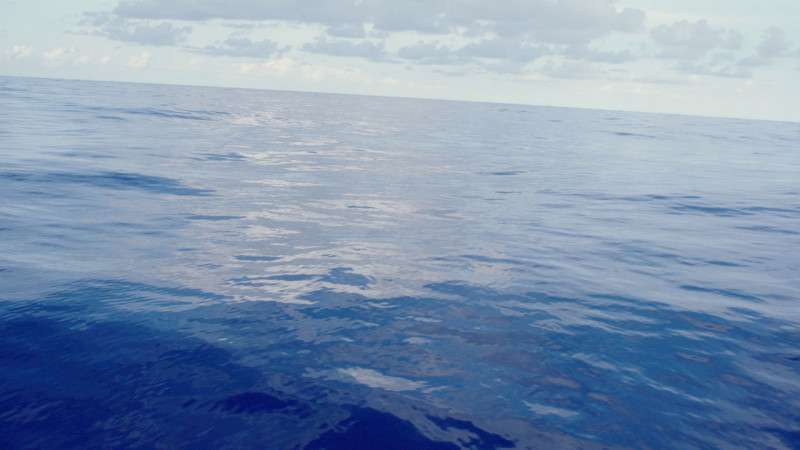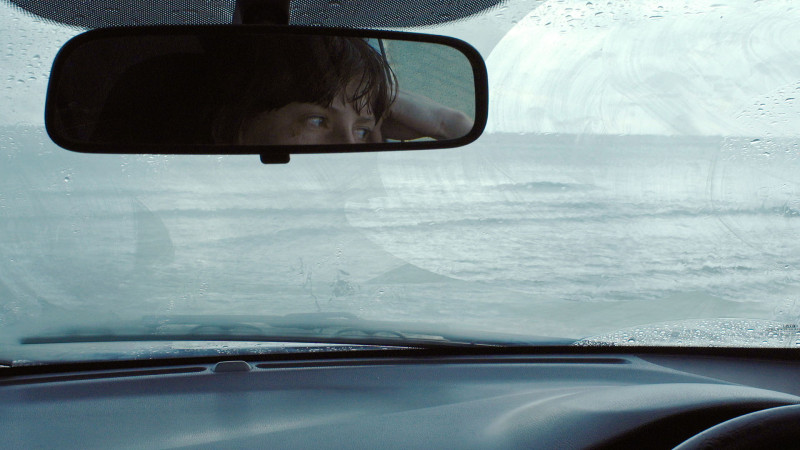Drift
Two women spend a weekend together at the North Sea. Walks on the beach, fish buns at a snack stand, mobile weather forecasts. Sky, horizon, water. One of them will soon return to her family in Argentina ,whereas the other one will try to come a step closer to the ocean. She travels to the Caribbean and the unknown makes her vulnerable.
Then, the land gets out of sight. On a sailing vessel she crosses the Atlantic Ocean. One wave follows the other, they never resemble. Thoughts go astray, time leaves the beaten track and the swell lulls to deep sleep. The sea takes over the narration. And when she reappears, the wind is still in her hair while the ground beneath her feet is solid. She returns and the other one could ask: „Have you changed?“
WHO
cast THERESA GEORGE, JOSEFINA GILL concept, direction, camera, montage HELENA WITTMANN concept, research THERESA GEORGE sound recording, sound design, composition NIKA BREITHAUPT focus puller PIA LAMSTER title design, dolly grip STEFFEN GOLDKAMP sound mix SIMON BASTIAN color grading TIM LIEBE production assistant LUISE DONSCHEN
produced by FÜNFERFILM & T, N, H funded by NEUE KUNST IN HAMBURG sponsored by SAILING CLASSICS GMBH, ZEIGERMANN_AUDIO & CINEGATE festival presentation funded by FILMFÖRDERUNG HAMBURG SCHLESWIG-HOLSTEIN & GERMAN FILMS
SENSUAL TOPOGRAPHIES
by Birgit Glombitza
It’s out there somewhere. Beyond the bed, the window, the balcony. As yet there is no horizon in the picture. The sky and the sea are still a whole, a diffuse, dull white. Two women take seats on a balcony, gaze into the distance over the gabled roofs of the vacation houses on Sylt. They smoke, they talk. Later, in a beach-front café, one of the women – Theresa, a field researcher, with whom the film will remain until the end – tells of the cosmic crocodile, which pedals earth and water to a primordial maritime soup. A mythical hunter appears, slays the animal and stops its movement. The waters calm, the particles of soil sink. Land emerges. Continents. Islands. The only thing missing is earthly presence. But regardless of which meta-history, creation myth or evolutionary theory human beings try to make sense of the world, in DRIFT, which leaves any plot, no matter how vague, behind, everything appears mythical. Until the film glides further and further into its own abstraction, and eventually seems to be only surface, movement, and space.
The other woman, Josefina, travels to Buenos Aires. The Atlantic becomes the threshold of their friendship. Theresa, whom we sometimes see working against backdrops of shells and seascapes, sets out for the Caribbean. She finally finds herself in the belly of a ship; she lingers, falls silent, she shifts. She will eventually return to her home, Hamburg; as a hybrid being of transported body, passing time, and ephemeral fluidity. DRIFT is the story of a transformation. Halfway through the film, the texture of the sea itself takes over, and the film surrenders its narration to the matter. Theresa, the researcher, isolated and objectified in the picture, becomes one of many parts. Time and again she is seen in front of and behind glass, as if she herself were on amicroscope slide. Inside a car, in the belly of the ship, in the shower, under waves of bedclothes. Driving, sitting, lying down. She no longer speaks. Whether on deck or in the cabin, she ceases movement. She is moved, swayed, rocked to sleep. The sea is the actor now. The heroine, if you like. And with its dark intransparency and increasingly magical charge, it is also the drama. And it is simply stunning how the camera finds, again and again, new images of the waves’ topographies and their reflections. The clear structure of the story contrasts these delicate surface explorations. Add to that the subtlesoundscape, which impels DRIFT into a hard-to-grasp and, at the same time, immensely sensual wake. At first, the sea is only hinted at. It is foreshadowed in a glass of water, in a rivulet, in the traces left on sand by wind and water. It sends its vanguard to the island as soft waves. In their eternal ebb and flow they take more and more of the land, becoming more and more creature-like, licking at the shore with their bubble-ringed tongues.
Later the Atlantic looms and begins to dominate the picture, becoming a projection surface for all first and final questions. Of the origin of species, or – in a close-up on the human phenotype – of the embryonic shelter, of the shroud for everything that has been. The edges of light and foam blend like the fasciae of a giant musculature. Sometimes the sea arches in great swells, and sparkles in licorice black. Sometimes it lolls under a circle of light, which may be an underlit sun or an overlit moon, and liquefies our time continuum against all sense of space. Without time and space, reason has little to hold on to. From time eternal, that is the moment of myth. At the end of the journey a cut catapults us onto foggy land. Cows stare wide-eyed into the camera. A strange lifeform has invaded their territory. Theresa sits in a tree. Like a primate, attempting to hide from the stares of zoo-goers, she has her back turned to us. She is calm and smokes, inhaling her own fog. Nothing more is needed to explain her mutation. Emblematically, as in a silent film, DRIFT slowly but persistently disintegrates our explanation of the world and of subjects, and dissolves the separation between agents and structure, between objects and beings. It happens so quietly, delicately, and subcutaneously, and without any sticky spirituality, that you’ll want to rub your eyes and look again to see if there may not be, after all, something that can help put things straight again. And when we are transported across the Elbe river by the public train, together with Theresa on her way home; both she and the faraway places beyond the window are not what they were before. The ending belongs to a perforated reality, one that can no longer mean anything cohesive or interdependently motivating. Rather, it is a coexistence of parts, beings and images. DRIFT is a multiple surface journey. Its depth and its dissonances develop in our heads simply by watching it. It is one of those films that, if you surrender yourself to it, becomes greater and greater. As such, it is a bit like its protagonist, the sea. The pure projection, mute, quietly powerful, and of such beauty that it is a gift for cinema.
Feature Film
97 minutes | Germany 2017
www.helenawittman.de/drift
Download presskit
SCREENINGS
-
- Settimana Internazionale della Critica Venezia, Italy
- International Film Festival Rotterdam, the Netherlands
- New Directors / New Films, New York, USA
- Jeonju Int. Film Festival, South Corea
- FICUNAM, Mexico City, Mexico
- FID Marseille, France
- Viennale 2018, Austria
- Lima Independiente Film Festival, Peru (special mention)
- FILMADRID, Spain (best film award)
- ZINEBI Bilbao (special mention)
- Lacenodoro Int. Film Festival (best feature film)
- Athens Int. Film & Video Festival, Ohio, USA (best narrative film)
- Tacoma Film Festival, USA (best narrative feature film)
- Festival du Nouveau Cinema Montreal, Canada
- New Horizons Int. Film Festival, Poland
- Filmfest Hamburg, Germany
- Berwick Film&Media Arts Festival, UK
- Nordic Filmdays Lübeck, Germany
- Doc Buenos Aires, Argentina
- Filmwoche Duisburg, Germany
- Kaunas Int. Film Festival, Lithuania
- Ton, Zeit, Bild, Filmladen Kassel, Germany
- Stranger Than Fiction Cologne, Germany
- EYE Film Institute Amsterdam / Dag van de Dwarse Film 2018, the Netherlands
- !f Independent Film Festival Istanbul, Turkey
- IBAFF Int. Film Festival Murcia, Spain
- Tabakalera San Sebastian, Spain
- Int. Film Festival Uruguay
- Oaxaca Cine, Mexico
- Int. Film Festival Cosquin, Argentina
- VariaVision Volksbühne Berlin, Germany
- Goethe Institut London, UK
- Garage Museum of Contemporary Art Moscow, Russia
- Festival de Cine Radical, Bolivia
- Antofacine Int. Film Festiva, Chile
- Frontera Sur Int. Film Festival, Chile
- KINO 2019, Portugal
- Tate Modern Starr Cinema, UK
- Duka Film Festival, Germany
- MIC Istmo, Mexico 2021
- La Simana Corsica, France 2022

-
STRANDZHA
a film by
Pepa Hristova -
DER FLECK
(SKILL ISSUE)
a film by Willy Hans -
DIE STIMME DES INGENIEURS
(the engineer's voice)
a short film by André Siegers -
PAPILLON
a short film by
Francesca Bertin -
STUPOR
a short film by
Leonie Kellein -
REPRODUKTION
a film by
Katharina Pethke -
LA EMPRESA
a film by
André Siegers -
HUMAN FLOWERS OF FLESH
a film by
Helena Wittmann -
Olanda
a film by
Bernd Schoch -
GESTERN, ICH DENKE AN MORGEN
a film by
Tom Otte -
Jedermann und ich
a film by
Katharina Pethke -
Landjaeger
a film by
Lilli Thalgott & Mignon Remé -
At the bottom of the Sea
a film by
Karsten Krause & Dan Boehl -
Was wahrscheinlich passiert wäre, wäre ich nicht zu Hause geblieben
Willy Hans' recent short
which Fünferfilm co-produced -
Piqueuses
by Kate Tessa Lee
and Tom Schön -
Sec Rouge
by Kate Tessa Lee
and Tom Schön -
Arrangement of Skin
a short film
by Karsten Krause





